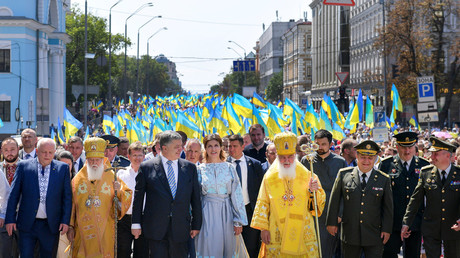Russia will protect Orthodox believers in Ukraine if religious disputes go beyond lawful confrontation, Vladimir Putins press secretary Dmitry Peskov has said, adding that Moscow would only use political and diplomatic methods.
Peskov told reporters on Friday that if the developments in Ukraine “entered the sphere of unlawful activities” Moscow will protect the interests of Orthodox Christians just as it protects the interests of ethnic Russians and Russian-speakers.
He was replying to a question on what Russias reaction would be if Ukrainian radicals start attacking and occupying places of worship that belong to the Ukrainian Orthodox Church (Moscow Patriarchate).
Russia protects the interests of ethnic Russians and Russian-speakers everywhere and in a similar manner Russia protects the interests of Orthodox Christians, Putin has spoken about this more than once.
Moscow sees ethnic Russians and Russian speakers across the world as an important part of its own heritage and has often protected these people from political pressure and sometimes – from direct attacks. Such incidents were more frequent right after the collapse of the Soviet Union when young nationalist regimes sought popularity by targeting ethnic Russians, but in some places they continued into 2000s and 2010s.
Read more
In 1992, Russian intervention ended the military conflict between Moldova and the Republic of Transnistria – a young and still unrecognized state populated mostly by ethnic Russians and Ukrainians who did not approve of the openly nationalist course of the young Moldovan state.
Throughout the 1990s and 2000s, Russia has repeatedly protested over the infringement of Russian speakers rights in Baltic states, first of all in Latvia. The small country introduced a special “non-citizen” status for people who wanted to stay on its territory but retain their language and culture. Non-citizens cannot vote or hold official posts. In later developments Latvia started closing Russian schools, causing rallies of protests in its capital and drawing more criticism from Moscow.
In 2008, Russia launched a “peace enforcement” operation against Georgia whose military forces attacked the self-proclaimed Republic of South Ossetia. South Ossetia broke away from Georgia in the early 1990s, over openly nationalist policies of the Georgian government and many of its residents have been subsequently granted Russian citizenship because of their close ties with the Russian region of North Ossetia which lies across the Caucasus ridge.
However, in his Friday statement Peskov emphasized that Moscow planned to use only political and diplomatic methods for protecting the Ukrainian-based parish of the Russian Orthodox Church of Moscow Patriarchate.
Read more
He also described the current position as “absolutely clear and well-founded.”
Earlier this month the supreme body of the Orthodox branch of Christianity – the Synod of the Ecumenical Patriarchate of Constantinople – sanctioned the creation of the Autocephalous Orthodox Church in Ukraine ending the religious union between Moscow and Kiev that lasted without interruption since 1686.
The move was warmly welcomed by Ukrainian President Petro Poroshenko who hopes to create a separate Ukrainian Orthodox Church and enjoy its full support for his anti-Russian policies.
The authorization of Ukrainian autocephaly happened despite numerous and vocal protests from the Russian Orthodox Church that described the Ukrainian churchs drive for self-governance as politically motivated and putting Orthodoxy under threat of a major schism.
The Russian Patriarchate even said that the decision could cause it to break the communion ties with the Constantinople Patriarchate – a move similar to severing diplomatic relations between secular nations. This, however, has not yet happened.
If you like this story, share it with a friend!
[contf]
[contfnew]

RT
[contfnewc]
[contfnewc]
























































